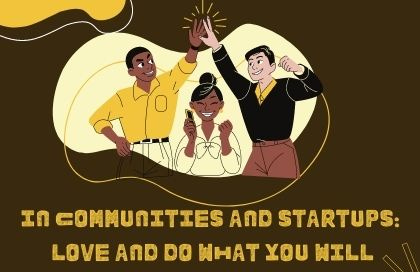In communities and startups, love and do what you will
Thoughts on the adventure of building communities
In my last #WeeklyInfographic of 2021, I reviewed the learnings that impacted me the most throughout the year. My good friend Rob Ryan replied with an amazing tweet:

Love is a key ingredient in building something meaningful. I agree!
And just as I read the tweet I got inspired to write this post. (Thank you, Rob!)
Of course, I don’t want to review my Twitter thread under the light of love. That would be dull from me and boring to you.
Better, I’d try to explore the implications of love in terms of creation, relationships and the community/startup topics I usually explore here. Let’s jump into it.
I. On the nature of the relationships of a community
We’ve stated before –quoting David Spinks- that relationships are the atomic unit of any community.
But there are many kinds of relationships. It’s not the same John being Anna’s co-worker as being Anna’s friend, or even Anna’s father.
So, what kind of relationships constitutes a community? The first thing to note is that not all kinds of relationships do it.
Accidental relationships nor merely transactional relationships are enough to achieve this. By definition, these kinds of relationships expire too quickly. I’ll argue that this doesn’t mean is something wrong or inherently bad in them: they are just another kind of relationship, a less powerful one in terms of belonging, purpose, commonality, etc.
So, we need to find relationships that (a) does not expire quickly, (b) allow its parts to align towards something common; (c) creates value for its parts.
These kinds of relationships are usually known in Philosophy as φιλία (philía) or friendship. And friendship is a fellowship1 between two or more persons, cities, guilds, etc2.
Now, friendships can evolve to different “levels of maturity” as Aristotle states in his Ethics (Book VIII):
There are therefore three kinds of friendship, equal in number to the things that are lovable: [1] those who love each other for their utility (…) in virtue of some good which they get from each other. (…) [2] the friendship of young people seems to aim at pleasure; for they live under the guidance of emotion, and pursue above all what is pleasant to themselves and what is immediately before them [3] Perfect friendship is the friendship of men who are good, and alike in virtue; for these wish well alike to each other.
If we would order these levels of friendship alongside the “levels” of community, it would appear that friendship for pleasure is closer to an audience and friendship for utility is closer to a network. Only the perfect friendship makes up the communities.3
But we should also note that, although communities emerge in the context of perfect friendships, being a complex system the communities will also include the other kinds of relationships inside them: we see relationships merely based on pleasure (“it’s nice to belong”, “it feels good to avoid FOMO”), others based on utility (“I receive value from XYZ members”, “I’m in the room where it happens”), and finally, some where the members pursue a common good for the sake of all.
Having said this, we can conclude that the nature of the relationships that build a community is friendship. And if we want to strengthen our communities we should aim for more perfect kinds of friendships, that is “for the purpose of a [common good]”4.
Let’s focus now on this kind of friendship, then.
II. Love as perfect friendship
Although there’s a lot to be told about love, for the sake of this essay I’ll accept that love is the best form of friendship, a refined way of perfect philía.
In this kind of love, the friends not only pursue a common good, but do it selflessly. Friends want to see the others better.
Quoting Paul from Tarsus:
Love is patient [over passionate], love is kind. It does not envy, it does not boast, it is not proud. It does not dishonor others, it is not self-seeking, it is not easily angered, it keeps no record of wrongs. Love does not delight in evil but rejoices with the truth. It always protects, always trusts, always hopes, always perseveres.
Love never fails.
The best of friendships is extroverted, in the sense of being ejected outside the self. The best of friendships is transcendent, in the sense of allowing the friends to create something that can outlive them.
In any community, the members hold a relationship of friendship. And if we want a strong community, the friendship should aspire to be this high.
Of course, it is an ideal, and as such is quasi-impossible to attain. But that should not imply we should not seek it. On the contrary: communities are the best and only space where we can pursue this quest.
I’ve noted that in the best communities (i.e. those where members are more cohesive and the vibe is healthier) the members have developed a sense of perfect friendship among them. They take care of each other and look for the best development of the whole, adding value and moderating best practices “even if it’s for free”.
One last note on love. This nature of love as the constitutive relationship that forms and shapes communities should not surprise us. As Plato discovered some years ago, Love is not a feeling nor a psychological stage: Love is a daimon, a bridge that connects the divine (i.e. the common good, the shared virtues) with the flesh (i.e. each person).
Love gives the reality its ontological structure. Love is the ontological structure of our communities.
III. Love and do what you will
In communities, members can do what they will because they love. And love serves as the ultimate moderator: guides actions and places restrictions that free the way to achieve common goods.
And when Augustine of Hippo states that if you love you can do whatever you will he is addressing exactly this. When you love, you won’t do anything that damages your friends or fellow members.
But… there’s a catch I believe. Love is perfect and we all can only aspire to imperfectly tend to love. We try to love, but we fail. Over, and over, and over again. And although we persevere in our community we need something else to help us ensure we are doing with our will what our communal love asks.
What is that something else? I believe Michael Ende discovered it in The Neverending Story.
In the book, there’s a scripture in the Symbol of Unrestricted Power that reads: “Tu was du willst”.
One could translate it as “Do what you will” or even “Do whatever you will”. But let me cast a small light and propose a nuanced translation: “Do what you do want”.
What I want to highlight is the underlying intentionality of the phrase. It’s not about the whims of the will, but the intentional definition of what one pursues.
First we need to consciously know what we want. Then we can do it.
The symbol’s scripture is not about being carried away by the winds of our desires (like could happen in more basic levels of friendship, as we saw before), but being intentional in achieving our goals.
In a community, this intentionality is our insurance against the imperfection of our love. We do want our common good, and that’s why we believe in each other, and support each other, and propel each other toward our goods. Also, this is why we bear each other’s shortcomings.
IV. 2022: a year to love (and be loved in return)
To finish these reflections, I want to turn my eyes to the next year. I believe it brings a great opportunity to strengthen our communities by making our friendships stronger.
At least, I will try to do so. I’ll try my best to learn to be a better friend for you. And I’ll try my best to learn how to be loved by you. After all, that’s what that boy said to us:
The greatest thing you'll ever learnIs just to love and be loved in return
Happy 2022!
Cf. Thomas Aquinas, S. Th. Ia-IIae, q. 4, a. 8; and also these two articles by myself:
Cf. Aristotle, Nichomachean Ethics, VIII & IX
Cf. Thomas Aquinas, S. Th. Ia-IIae, q. 4, a. 8: I replaced “good operation” for “common good” because I believe it’s clearer in this context and it better connects with the thesis of my previous essays.







